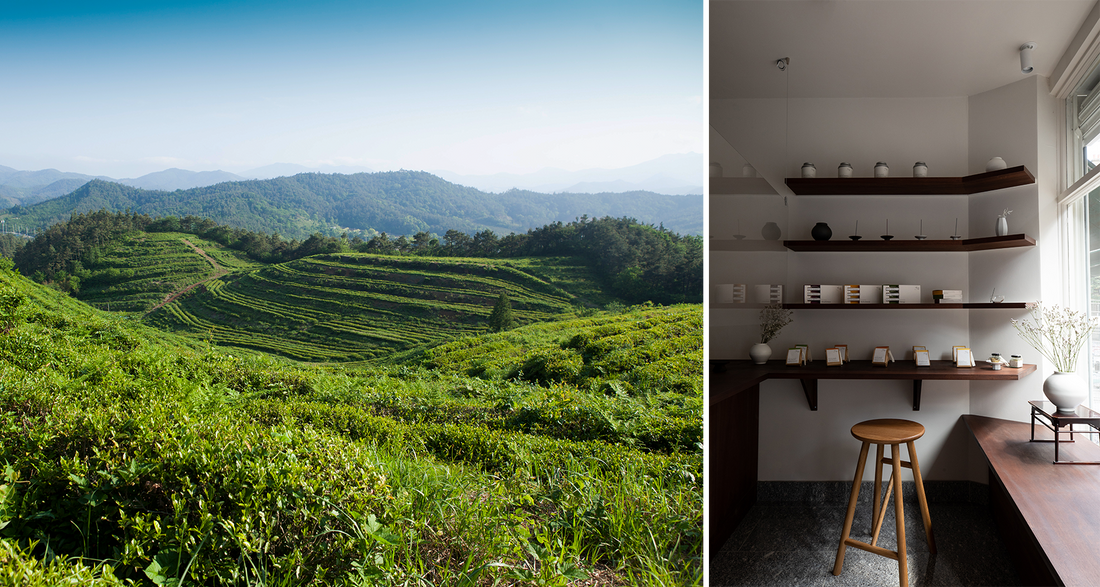
Could you tell us a little bit about yourself and your story, how did it all begin?
I run a small Korean tea brand called be-oom. be-oom offers naturally sourced tea from small farms in Korea. be-oom /bi:-u:m/ means ‘to empty’ in Korean – finding a place within the mind to empty and fill, all while emptying a cup of tea.
My background is not in tea, actually – I studied Philosophy and Economics and later Real Estate and Infrastructure Finance. While working as a management consultant, I felt the urge to explore a more creative side of myself. At the time I had just begun doing yoga and meditation and saw that tea was often an element. I then became fascinated by tea and started visiting tea farms in Korea.

What was the inspiration behind starting be-oom?
I wanted to create a space where people could come to ‘empty’ their mind and also a cup of tea, as well as introducing Korean tea to the U.K. and Europe. When I tasted good Korean teas for the first time, I was blown away and immediately wanted to share with everyone else.
What drew you to the world of tea?
It’s all thanks to the meditative trait of tea – all your senses have to come together to appreciate the tea brewing in front of you. It requires focus to understand what you’re seeing, smelling, tasting and feeling – helps you be ‘in the moment’. I used to have many anxieties from thinking about the past and future, but tea, and tea drinking practice really taught me how to be in the moment and I started to feel more in the present, and therefore more alive through that.
Could you give us some insight into the history of Korean tea culture and what it means to you?
Tea was introduced to Korea in 8th century and there was a long-standing tradition and rituals associated with tea until the last kingdom of Korea, Joseon Dynasty, whose main school of thought was Confucianism, instead of Buddhism. The tea culture then became informal and tea was consumed in a more casual fashion, which has continued into the modern age. The interpretation of ‘traditional’ tea rituals therefore is a little more relaxed compared to those in neighbouring countries – this gives me a lot of flexibility in how I present Korean teas and this is also the reason why I was able to create a ‘modern’ Korean tea brand.
What's your favourite tea from the be-oom range?
My favourite tea is Hadong Black from a three-generation tea farm based in Hadong, Korea. It’s delicate, but also quite complex with a strong hint of cocoa.
Be-oom has such a thoughtful sense of design throughout your tea store and product range — could you walk us through your creative process
The tearoom was designed such that guests can enjoy every aspect of the process, to enable all senses to come alive, from watching tea being brewed, to pouring and to smelling and tasting the tea. Luckily our visitors have responded to this effort and appreciate the serenity.
We have applied the same thought and method to the product design as well – it’s minimalistic, with a focus on the product itself, rather than loud prints or designs, again to appreciate the serenity that the product brings.
Do you feel there is a connection between tea and well-being?
Definitely. It goes back to the meditative trait of tea I discussed earlier – your senses come alive through tea brewing and drinking practice and your mind becomes focused on the ‘moment’. Tea is central to meditation and Buddhist rituals in many cultures for this reason. Other than benefits to mental well-being, it also has physical benefits – tea is full of anti-oxidants and is anti-inflammatory and is known to reduce blood pressure and blood sugar levels.
What are some of the most valuable and surprising aspects of running be-oom?
The most valuable aspects, and most surprising aspects have both been people, whether they be collaborators, clients or customers that randomly walk through the door. Through be-oom, I have made some incredible connections and relationships, which developed organically over time and some of these connections now have become my best friends. Tea has helped fuel these relationships naturally also – the most honest and candid conversations I have had are over a cup of tea and tea really brings out the truest versions of ourselves.
Do you have any exciting plans you can share with us for the near future?
Earlier this year we launched ‘CHA-OOM’ which means to ‘fill’. While be-oom’s purpose is to empty the mind and create a space to focus on the mind, we wanted to introduce a contrasting concept/space where you get your fill of energy through tea. We are hoping to expand it in the next couple of years, hopefully across the U.K. and in other countries, if appropriate opportunities arise.
For be-oom, we are looking to extend our product range, both tea and lifestyle, and also operate it as a mini-gallery for Korean craft.

